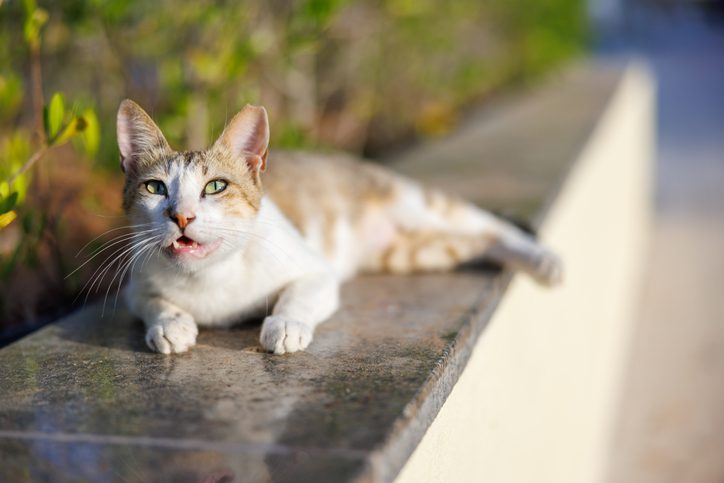Why is My Cat Coughing in Dunedin, FL?
Often, the noises associated with coughing are dreadful and anxiety-inducing for any cat owner. But they may be nothing to worry about when associated with infrequent hairball releases (about once a month) or vomiting after eating food too quickly.
But what if the cough is more persistent, it could be a sign that there is an underlying issue going on. Read our Dunedin, FL, animal hospital‘s article below learn more about why your cat is coughing and how you can help them.

Potential Causes
While the occasional hairball or vomiting episode can cause mild coughing in a cat, there are a host of other thing that could be the source of more severe bouts of coughing—which a veterinarian can diagnose through a complete review of health history, physical examination, and diagnostic tests.
Infection
Often, a cat’s coughing is related to an infection caused by viruses, like feline viral rhinotracheitis, or bacteria, such as Bordetella, fungus, and parasites.
Cats who are not treated run the risk of getting pneumonia, both fungal or parasitic. The inhalation of spores from the soil is thought to be the source of most fungal infections, whereas parasites such as lungworms and flukes can invade a cat’s air passages. An appropriate antimicrobial prescription and administration to the cat can help with this.
Pleural Effusion
This disorder is caused by the abnormal build-up of fluids around a cat’s lungs. The fluid can be removed with a needle and a syringe, but other treatments are sometimes needed to determine the source of the fluid is and to prevent further build-up.
Inhaled Foreign Objects
Just like in humans, cats that inhale foreign objects (like food, grass, etc.) will react by coughing in order to get it out of their respiratory tract.
Removal of whatever has been inhaled and is disturbing your cat by utilizing a bronchoscopy or surgery. Antibiotics may also be prescribed to avoid a second infection. This removal is important because untreated cats are at risk of developing aspirational pneumonia, which can develop after a foreign object disrupts the sensitive lining of the stomach.
Asthma
Also, like humans, cats diagnosed with asthma experience swelling in, narrowing of, and accumulation of mucus in the airways—all of which can cause coughing.
Removal of potential triggers in the cat’s environment, along with inhaled or systemic medications, should be administered to dilate the airways and reduce inflammation and swelling.
Cancer
Coughing can sometimes be the first symptom an owner notices when their cat develops cancer that affects the respiratory tract.
Chemotherapy, radiotherapy, surgery, immunotherapy, and/or palliative care are the best treatment methods for this.
Trauma
Injuries (physical, chemical, or thermal) in the respiratory tract can cause coughing in cats. Healing, management, and potential surgery can help treat this.
General Treatments
Every cause of a cat’s coughing will have specific treatment, but there are general things you can do to ease your pet’s coughing and they should only be used if recommended by your vet. They include:
- Fluid and oxygen therapy
- Wiping nasal discharge
- Putting your cat in the bathroom with a steamy shower running to loosen congestion
Distinctions of Symptoms
While cat owners should bring an animal who is consistently coughing to a vet as soon as possible, there are certain things they can look out for in order to discern for themselves and assist the veterinarian in diagnosing what the cause is.
Wet vs. Dry Cough
A wet cough comes with the production of phlegm, which aids the body in clearing viruses, bacteria, or other materials out of the lungs. A dry cough, however, does not produce phlegm. Not that much of it, at least. These coughs are usually the result of asthma, cancer, and inhaled foreign bodies.
Other Symptoms
Coughing, in conjunction with other symptoms, can hint at what your cat is suffering from, including:
- Sneezing (often experienced by cats with upper respiratory infections)
- Wheezing (often occurring in animals with asthma)
- Blood (should be treated as an emergency and commonly associated with trauma, cancer, severe infection, and exposure to poisons)
Kennel Cough
It is not uncommon for dogs to be diagnosed with “kennel cough,” also known as “infectious layrngotracheitis.” This is a highly contagious upper respiratory infection with a variety of bacteria and viruses that may include Bordetella bronchiseptica, mycoplasma, parainfluenza virus, adenovirus type 2, and canine coronavirus.
Cats are only susceptible to some of these. For example, it is known for sure that cats can catch kennel cough through Bordetella, which is a type of bacteria found in a dog’s saliva. So, a cat can become infected by licking a sick dog. Once infected, a cat will start producing thick, yellow mucus.
Cats are especially susceptible to kennel cough through the exposure to Bordetella because they do not have a protective larynx. If your cat contracts kennel cough, it will, of course, experience coughing, along with a possible runny nose and fever. In order to heal, it should get plenty of rest and fluids. Untreated felines are at risk of developing lower respiratory infections and infectious pneumonia.
Contact a Veterinarian in Dunedin, FL if Your Cat is Coughing
Early detection, diagnosis, and treatment for a chronic or severe cough are all key in quickly alleviating your cat’s symptoms. If you notice your cat demonstrating any of the symptoms described above, or others that cause alarm, please consult your veterinarian immediately. Reach out to our Dunedin, FL, animal hospital team by giving us a call at (727) 953-6588.
